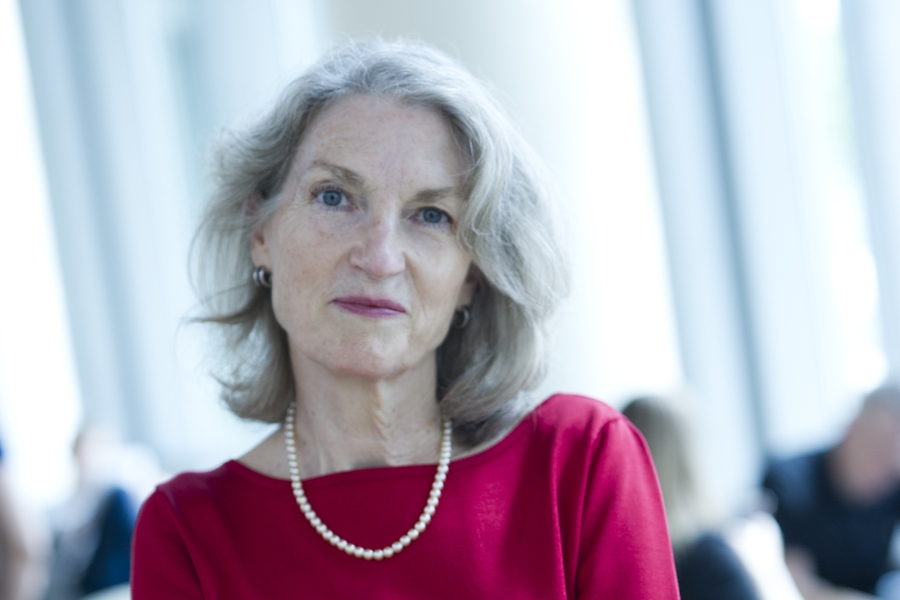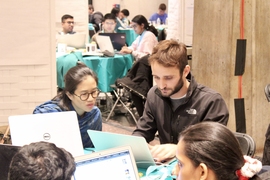After a 30-year career focused on the economic institutions of wealthy democracies, Kathleen Thelen, the Ford Professor of Political Science, has recently begun carving out time from her globe-hopping schedule to pursue compelling opportunities closer to home.
“At a certain point in your career, you feel that part of what you want to do is give back,” says Thelen, who is a member of the American Academy of Arts and Sciences and holds a permanent appointment at the Max Planck Institute for the Study of Societies and honorary degrees from three European universities.
As the 2017-18 president of the 12,000-member American Political Science Association (APSA), Thelen is spearheading an effort to understand and address the challenges to career advancement faced by women with doctorates in political science.
Thelen will also be a key player in MIT’s Task Force on the Work of the Future, an Institute-wide venture launched in February to explore the impacts of technology on jobs. “The task force will be putting the interaction of technology and society at the forefront,” she says. “This connects directly with my research to understand how new technologies and forms of work organization can be steered in ways that balance generating economic efficiencies with providing some level of social solidarity and equality.”
Striking a balance
Since graduate school at the University of California at Berkeley, Thelen has been concerned with the ways rich democracies strike such a balance. She is particularly preoccupied by whether wealthy nations act to cushion skilled and unskilled labor from economic shocks tied to recession or technological change.
Her approach to these topics involves comparing the economic institutions, markets, and policies of different nations. In one notable example, Thelen traced different systems of vocational education and training in the U.S., Britain, Germany, and Japan over 100 years. Her richly detailed analysis, which resulted in the award-winning book, “How Institutions Evolve” (2005), yielded some unexpected findings.
In Germany she discovered “a surprising continuity in core vocational training institutions despite convulsive ruptures in high politics,” she says. Through two world wars, a depression, and the advent of mass manufacturing, Germany committed to high level education and training for a large population not bound for college. These students, she says, “go on to high quality apprenticeships and high prestige jobs with Lufthansa, BMW, or Mercedes.”
In contrast, Thelen says, “the U.S. allowed the whole vocational training track to erode, and to become stigmatized.” During the 20th century, educational orthodoxy and related policy promoted the idea that only a college education yielded high paying employment. But not all students found college attainable, leaving many lacking well-paid work, especially as manufacturing and other industry jobs migrated overseas. Today, says Thelen, “Employers often have a hard time recruiting skilled labor and must look elsewhere.”
The new normal
One of Thelen’s current concerns is the issue of precarity — defined as exposure to social risks and financial insecurity. Precarity is the new normal for millions of employees in the new “gig economy,” as large, networked firms worldwide “abdicate any responsibility for contractual wages, hours, and benefits,” says Thelen. “People are in a position of self-provisioning.”
In a recent paper, Thelen investigates Uber and the impacts of its business model in the U.S., Germany, and Sweden, documenting the very different regulatory responses and outcomes across the three countries. Uber represents a model, she believes, that is swiftly becoming a defining feature of 21st century capitalism.
She also takes aim at Amazon, “a hugely powerful company that is one of the worst employers in the U.S.,” she says. “For people who work at fulfillment centers, it is brutal and pretty precarious employment.”
Amazon’s impact, like that of other largescale employers that rely heavily on atypical work contracts, tends to prove vastly more negative in the U.S. than in other wealthy democracies, adds Thelen. That’s because in America, benefits like health care, sick pay, vacation time, and retirement tend to be attached to employment, whereas other countries guarantee them as rights to citizens. And labor unions and organizing are deeply constrained by prevailing labor laws in this country compared to other democracies, so whether in home health care, public service, or the retail sector, workers receive lower pay and fewer benefits.
“The more I write about precarity, the more I’m drawn to thinking about policy and potential interventions,” says Thelen. As a member of MIT’s Future of Work taskforce, Thelen will be researching measures other nations deploy to reduce precarity for a “fluid army of contingent workers.” She will spotlight this issue in her keynote address this summer at the APSA annual conference.
Thelen is also using her APSA presidency to address a different kind of employment issue: “For the past 10 years close to 50 percent of all newly minted PhDs in political science were women, but you’d never know that looking at the websites of top political science departments and top journals in the field,” says Thelen. “This has motivated me to figure out what is going on.”
With the help of a National Science Foundation grant, she has launched an APSA task force to research “where the bottlenecks and chokepoints are, and ways to make sure women have the full range of career options open to them.” Just as a previous generation of women pioneered the way for her, Thelen hopes to serve the coming cohort — frequently in person. She mentors female political scientists at MIT and beyond, and opens her home to meetings to discuss ways to make MIT’s own department more attentive to potential obstacles to their career growth.
“I’ve had a lot of good breaks, and love my work,” says Thelen. “I want to do anything I can to help a younger generation make their way in the profession.”









